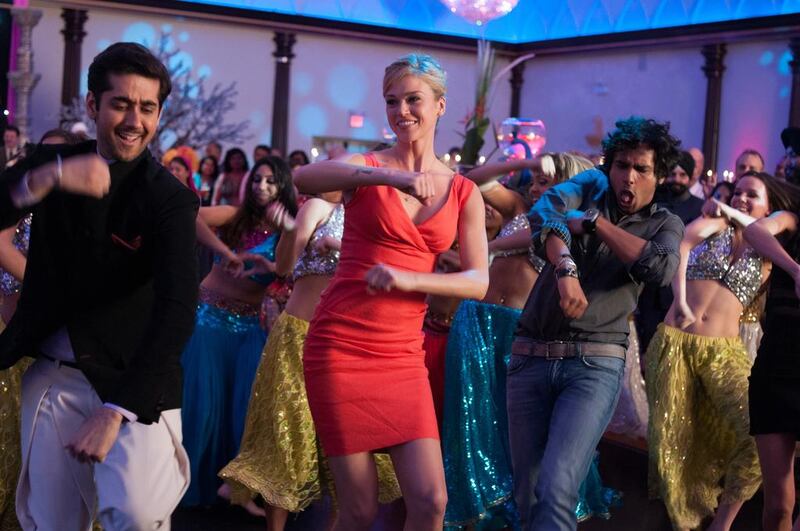Producers of the forthcoming film Dr Cabbie are not risking getting lost within a spate of screenings set for the Toronto International Film Festival (TIFF). Instead, they are launching a major publicity tour in the same city tomorrow – a week before the September 4-14 festival begins.
Even Salman Khan, the well-known Bollywood actor, is expected to appear in Toronto to promote the film. It marks the first international film project that his company, SKBH Productions, helped produce.
Dr Cabbie was reportedly set to premiere at TIFF but will now be released in Canada on September 19. It is also likely to be released in the UAE, although a date has not yet been announced.
The film features Vinay Virmani, a Toronto native who also worked as its creative producer and is best known for his portrayal of a minority hockey player battling discrimination in Breakaway.
In Dr Cabbie, Virmani plays Deepak, a doctor from India who moves to Toronto then struggles to earn a living. After taking a job as a taxi driver, Deepak transforms his cab into a mobile health clinic and becomes a local hero of sorts, particularly after he helps deliver a baby in the back of his taxi.
“The cliché baby-in-the-back-of-a-taxi happens more often than you think,” says Ron Kennell, who co-wrote the film’s screenplay along with Virmani and Manu Chopra. “All cab drivers are trained to do that.”
The scene was one of many that the film's trio of co-writers decided to keep in their story, which dates back to 2003 when Kennell started working on the screenplay alone. Back then, he toyed with stretching Dr Cabbie's story over a series, but then shelved the project while he wrote other screenplays.
"Dr Cabbie was the first that came off the shelf," says Kennell, who in 2012 met Virmani and the actor's father, Ajay, the producer behind Bollywood/Hollywood and Deepa Mehta's Water.
“When I finally met Ajay and Vinay, we were working on similar ends and different treatments,” Kennell adds. “We hit it off right away and found a good way of working. It wasn’t without bumps along the way… [but] we didn’t need a lot of writers, which was exciting for me on my first film.”
Certain characters from Kennell's version were ultimately cut, although comedy fans will probably enjoy the portrayal of Tony, who is played by The Big Bang Theory star Kunal Nayyar.
Some plot lines also changed after Kennell began collaborating with Virmani and Chopra.
For example, in Kennell’s story Deepak was already married when he immigrated to Canada. The lead character expected he’d come to Toronto, where his wife was already working, and quickly find a job. However, he couldn’t secure medical residency in a local hospital.
“His shame was that much greater [because] they lived with his wife’s mother, which was embarrassing for her and her social circle that she had created in Toronto,” says Kennell. “[The mother] didn’t want others to know her daughter was married to a cab driver.”
In Virmani’s version, which ultimately made it to film, Deepak’s discovery of love and challenges with work, as well as family issues, are all explored – often with comedic undertones. His version, Kennell acknowledges, “did illuminate some of the family circumstances and made them much more plausible”.
The original story also failed to address the legal implications of a cab driver converting the back of his vehicle into a mini medical clinic. That’s where Chopra, a writer with First Take Entertainment, came in. “There were things I was unable to answer that Manu was able to and we were able to fill in the blanks,” says Kennell.
Even so, it was not always easy to concede certain changes.
“You don’t want to give your baby away, but you know that to have things made, you have to share,” says Kennell.
“Essentially I would write, come back and we’d compare notes on the treatment. We’d collaborate and [say] this is what’s going to happen.”
In some ways, Dr Cabbie is also an achievement of cross-cultural moviemaking between India and Canada, with industry professionals from both countries having a hand in its creation. And while some of the fantasy-like scenes that Bollywood viewers have grown accustomed to seeing play out on the big screen will certainly make an appearance, they will include a multicultural cast set in a city that is known for its diverse population.
The film’s theme, Kennell says, is one that can be universally understood. “It talks about the struggle of fitting into the world, what it means to fulfil your true calling and questions whether you should be good at everything,” he says.
Dr Cabbie opens in Canada on September 19










